
Yankton is a city in and the county seat of Yankton County, South Dakota, United States.
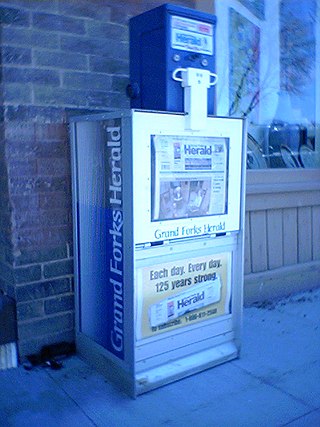
The Grand Forks Herald is a daily broadsheet newspaper, established in 1879, published in Grand Forks, North Dakota, United States. It is the primary daily paper for northeast North Dakota and northwest Minnesota. Its average daily circulation is approximately 7,500, in the city of Grand Forks plus about 7,500 more to the surrounding communities. Total circulation includes digital subscribers. It has the second largest circulation in the state of North Dakota.

Graceland Cemetery is a large historic garden cemetery located in the north side community area of Uptown, in Chicago, Illinois, United States. Established in 1860, its main entrance is at the intersection of Clark Street and Irving Park Road. Among the cemetery's 121 acres (49 ha) are the burial sites of several well-known Chicagoans.

There are 461 properties and historic districts listed on the National Register of Historic Places in North Dakota. There are listings in 52 of North Dakota's 53 counties.

This list is of the properties and historic districts which are designated on the National Register of Historic Places or that were formerly so designated, in Hennepin County, Minnesota; there are 190 entries as of April 2023. A significant number of these properties are a result of the establishment of Fort Snelling, the development of water power at Saint Anthony Falls, and the thriving city of Minneapolis that developed around the falls. Many historic sites outside the Minneapolis city limits are associated with pioneers who established missions, farms, and schools in areas that are now suburbs in that metropolitan area.

Feraud General Merchandise Store, also known as 1903 Building, was built in 1903 in Ventura, California. Jules Feraud opened the Feraud Bakery and Grocery Store and the bakery stayed in the family until 1944. The brick building is a rare intact example of turn-of-the-century commercial architecture during Second Land Boom after the tracks of the Southern Pacific Railroad arrived in Ventura. The City Council of Ventura designated the building Historic Landmark Number 35 by resolution on July 17, 1978. The building was listed on the National Register of Historic Places in 1986.

This is a list of the National Register of Historic Places listings in Winona County, Minnesota. It is intended to be a complete list of the properties and districts on the National Register of Historic Places in Winona County, Minnesota, United States. The locations of National Register properties and districts for which the latitude and longitude coordinates are included below, may be seen in an online map.
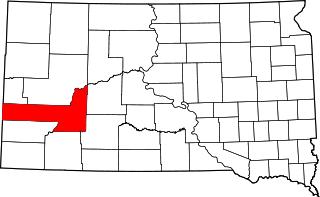
This is a list of the National Register of Historic Places listings in Pennington County, South Dakota.

This is a list of the National Register of Historic Places listings in Brule County, South Dakota.

This is a list of the National Register of Historic Places listings in Hughes County, South Dakota.

This is a list of National Register of Historic Places listings in New Haven, Connecticut.
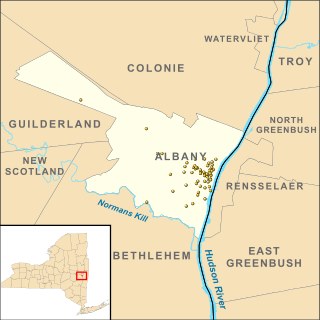
There are 75 properties listed on the National Register of Historic Places in Albany, New York, United States. Six are additionally designated as National Historic Landmarks (NHLs), the most of any city in the state after New York City. Another 14 are historic districts, for which 20 of the listings are also contributing properties. Two properties, both buildings, that had been listed in the past but have since been demolished have been delisted; one building that is also no longer extant remains listed.
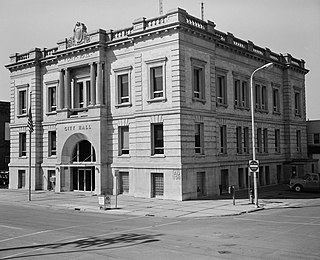
John W. Ross (1848–1914) was the first licensed architect in Grand Forks, North Dakota.
Yegen House and Pioneer Grocery, in Bismarck, North Dakota, was listed on the National Register of Historic Places. It was built in 1874. The owner John Yegen was an immigrant from Switzerland. The listing, in 1977, included three contributing buildings. The site was delisted in 2011, due to the house being demolished and the Grocery being relocated to the Missouri Valley Fairgrounds in 1993.

The Pisek School in Pisek, North Dakota is a Classical Revival building. Pisek School was listed on the National Register of Historic Places in 1994.

Charles Sumner Sedgwick was an American architect based in Minneapolis, Minnesota.
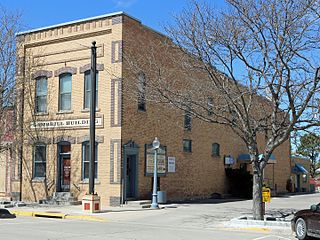
The Gambrill Storage Building is a historic two-story building in Rapid City, South Dakota. It was designed in the Renaissance Revival style, and built in 1910 by Horace C. Gambrill.

The Eller Apartments are a historic apartment building in Albuquerque, New Mexico. The apartments were built in 1922 by Dr. Charles A. Eller (1879–1967), a prominent local dentist, and are believed to be the city's second oldest apartments after the Washington Apartments. The building was designed by Trost & Trost of El Paso and built by E. J. Marchant, the same team who completed the no longer extant Castle Apartments the same year. The apartments were positioned at the luxury end of the market and were home to well-known residents including former Governor Merritt C. Mechem. The building was added to the New Mexico State Register of Cultural Properties in 1983 and the National Register of Historic Places in 1984.

The Pap Madison Cabin is a historic site located in Rapid City, South Dakota near The Journey Museum and Learning Center, it is the oldest Euro-American building in the Black Hills area. The cabin was built in 1876 by pioneer Rufus 'Pap' Madison using cottonwood found alongside the banks of the nearby Rapid Creek. Madison stayed in the house from its completion until 1889, when he sold the land to Rapid City's founder, John Brennan. Brennan gave the cottage to the city in 1926.

The Midland Depot was built by the Chicago and North Western Railway (C&NW) in 1907 as part of an extension from Pierre to Rapid City. It is located on Main Street in Midland, South Dakota. The building is a two-story wooden depot, built to the C&NWs' plan number 4 design, of a standard combination depot with living rooms overhead. In 1939, the Midland Depot had a single daily departure in each direction, to Chicago or Rapid City via the Minnesota & Black Hills Express. Passenger service ended October 24, 1960, with the discontinuance of the Dakota 400. Today the depot houses the Pioneer Museum.






















